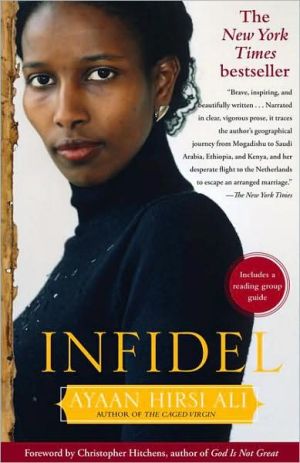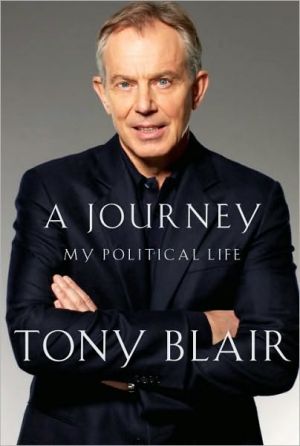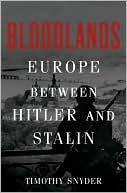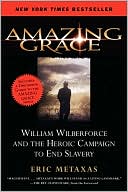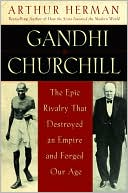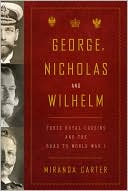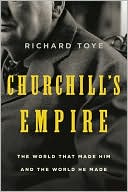Infidel
Ayaan Hirsi Ali captured the world’s attention with Infidel, her coming-of-age memoir, which spent thirty-one weeks on the New York Times bestseller list.\ Ayaan Hirsi Ali is one of today’s most admired and controversial political figures. She burst into international headlines following the murder of Theo van Gogh by an Islamist who threatened she would be next; and she made headlines again when she was stripped of her citizenship and forced to resign from the Dutch Parliament.\ Infidel...
Search in google:
In this profoundly affecting memoir from the internationally renowned author of The Caged Virgin, Ayaan Hirsi Ali tells her astonishing life story, from her traditional Muslim childhood in Somalia, Saudi Arabia, and Kenya, to her intellectual awakening and activism in the Netherlands, and her current life under armed guard in the West. One of today's most admired and controversial political figures, Ayaan Hirsi Ali burst into international headlines following an Islamist's murder of her colleague, Theo van Gogh, with whom she made the movie Submission. Infidel is the eagerly awaited story of the coming of age of this elegant, distinguished -- and sometimes reviled -- political superstar and champion of free speech. With a gimlet eye and measured, often ironic, voice, Hirsi Ali recounts the evolution of her beliefs, her ironclad will, and her extraordinary resolve to fight injustice done in the name of religion. Raised in a strict Muslim family and extended clan, Hirsi Ali survived civil war, female mutilation, brutal beatings, adolescence as a devout believer during the rise of the Muslim Brotherhood, and life in four troubled, unstable countries largely ruled by despots. In her early twenties, she escaped from a forced marriage and sought asylum in the Netherlands, where she earned a college degree in political science, tried to help her tragically depressed sister adjust to the West, and fought for the rights of Muslim immigrant women and the reform of Islam as a member of Parliament. Even though she is under constant threat -- demonized by reactionary Islamists and politicians, disowned by her father, and expelled from her family and clan -- she refuses to be silenced. Ultimately a celebration of triumph over adversity, Hirsi Ali's story tells how a bright little girl evolved out of dutiful obedience to become an outspoken, pioneering freedom fighter. As Western governments struggle to balance democratic ideals with religious pressures, no story could be timelier or more significant. The Washington Post - Anne Applebaum Infidel is a unique book, Ayaan Hirsi Ali is a unique writer, and both deserve to go far.
Introduction\ One November morning in 2004, Theo van Gogh got up to go to work at his film production company in Amsterdam. He took out his old black bicycle and headed down a main road. Waiting in a doorway was a Moroccan man with a handgun and two butcher knives.\ As Theo cycled down the Linnaeusstraat, Muhammad Bouyeri approached. He pulled out his gun and shot Theo several times. Theo fell off his bike and lurched across the road, then collapsed. Bouyeri followed. Theo begged, "Can't we talk about this?" but Bouyeri shot him four more times. Then he took out one of his butcher knives and sawed into Theo's throat. With the other knife, he stabbed a five-page letter onto Theo's chest.\ The letter was addressed to me.\ Two months before, Theo and I had made a short film together. We called it Submission, Part 1. I intended one day to make Part 2. (Theo warned me that he would work on Part 2 only if I accepted some humor in it!) Part 1 was about defiance — about Muslim women who shift from total submission to God to a dialogue with their deity. They pray, but instead of casting down their eyes, these women look up, at Allah, with the words of the Quran tattooed on their skin. They tell Him honestly that if submission to Him brings them so much misery, and He remains silent, they may stop submitting.\ There is the woman who is flogged for committing adultery; another who is given in marriage to a man she loathes; another who is beaten by her husband on a regular basis; and another who is shunned by her father when he learns that his brother raped her. Each abuse is justified by the perpetrators in the name of God, citing the Quran verses now written on the bodies of the women. These women stand for hundreds of thousands of Muslim women around the world.\ Theo and I knew it was a dangerous film to make. But Theo was a valiant man — he was a warrior, however unlikely that might seem. He was also very Dutch, and no nation in the world is more deeply attached to freedom of expression than the Dutch. The suggestion that he remove his name from the film's credits for security reasons made Theo angry. He told me once, "If I can't put my name on my own film, in Holland, then Holland isn't Holland any more, and I am not me."\ People ask me if I have some kind of death wish, to keep saying the things I do. The answer is no: I would like to keep living. However, some things must be said, and there are times when silence becomes an accomplice to injustice.\ This is the story of my life. It is a subjective record of my own personal memories, as close to accurate as I can make them; my relationship with the rest of my family has been so fractured that I cannot now refresh these recollections by asking them for help. It is the story of what I have experienced, what I've seen, and why I think the way I do. I've come to see that it is useful, and maybe even important, to tell this story. I want to make a few things clear, set a certain number of records straight, and also tell people about another kind of world and what it's really like.\ I was born in Somalia. I grew up in Somalia, in Saudi Arabia, in Ethiopia, and in Kenya. I came to Europe in 1992, when I was twenty-two, and became a member of Parliament in Holland. I made a movie with Theo, and now I live with bodyguards and armored cars. In April 2006 a Dutch court ordered that I leave my safe-home that I was renting from the State. The judge concluded that my neighbors had a right to argue that they felt unsafe because of my presence in the building. I had already decided to move to the United States before the debate surrounding my Dutch citizenship erupted.\ This book is dedicated to my family, and also to the millions and millions of Muslim women who have had to submit.\ Copyright © 2007 by Ayaan Hirsi Ali
Contents Introduction Part I: My Childhood Chapter 1: Bloodlines Chapter 2: Under the Talal Tree Chapter 3: Playing Tag in Allah's Palace Chapter 4: Weeping Orphans and Widowed Wives Chapter 5: Secret Rendezvous, Sex, and the Scent of Sukumawik Chapter 6: Doubt and Defiance Chapter 7: Disillusion and Deceit Chapter 8: Refugees Chapter 9: Abeh Part II: My Freedom Chapter 10: Running Away Chapter 11: A Trial by the Elders Chapter 12: Haweya Chapter 13: Leiden Chapter 14: Leaving God Chapter 15: Threats Chapter 16: Politics Chapter 17: The Murder of TheoEpilogue: The Letter of the Law Acknowledgments
\ From Barnes & NobleSomali-born author Ayaan Hirsi Ali is one of the most controversial women on earth. For years, she has been forced to live in hiding; her life has been threatened numerous times; an anti-Koran script that she wrote provoked the assassination of filmmaker Theo Van Gogh; and a dispute over her citizenship indirectly brought down the Dutch government. This memoir about her family's travails living under strict fundamentalist Islamic precepts tracks the evolution of a world-changing radical feminist.\ \ \ \ \ William GrimesThe circuitous, violence-filled path that led Ms. Hirsi Ali from Somalia to the Netherlands is the subject of Infidel, her brave, inspiring and beautifully written memoir. Narrated in clear, vigorous prose, it traces the author’s geographical journey from Mogadishu to Saudi Arabia, Ethiopia and Kenya, and her desperate flight to the Netherlands to escape an arranged marriage.\ &3151; The New York Times\ \ \ Anne ApplebaumInfidel is a unique book, Ayaan Hirsi Ali is a unique writer, and both deserve to go far.\ — The Washington Post\ \ \ \ \ Publishers WeeklyReaders with an eye on European politics will recognize Ali as the Somali-born member of the Dutch parliament who faced death threats after collaborating on a film about domestic violence against Muslim women with controversial director Theo van Gogh (who was himself assassinated). Even before then, her attacks on Islamic culture as "brutal, bigoted, [and] fixated on controlling women" had generated much controversy. In this suspenseful account of her life and her internal struggle with her Muslim faith, she discusses how these views were shaped by her experiences amid the political chaos of Somalia and other African nations, where she was subjected to genital mutilation and later forced into an unwanted marriage. While in transit to her husband in Canada, she decided to seek asylum in the Netherlands, where she marveled at the polite policemen and government bureaucrats. Ali is up-front about having lied about her background in order to obtain her citizenship, which led to further controversy in early 2006, when an immigration official sought to deport her and triggered the collapse of the Dutch coalition government. Apart from feelings of guilt over van Gogh's death, her voice is forceful and unbowed-like Irshad Manji, she delivers a powerful feminist critique of Islam informed by a genuine understanding of the religion. 8-page photo insert. (Feb.) Copyright 2006 Reed Business Information.\ \ \ \ \ Library JournalHirsi Ali (The Caged Virgin) first came to the world's attention with the gunning down of filmmaker Theo van Gogh in Amsterdam by a Muslim extremist. A note pinned to van Gogh threatened Hirsi Ali's life for collaborating with him on Submission, a short film criticizing Muslims for wife beating and forced marriages. In this memoir, the Somalian-born author tells of her journey to Saudi Arabia, Ethiopia, and Kenya, undergoing genital mutilation, being schooled by strict Muslim teachers, and finally facing shame from her family and clan for turning against Islam. In her early twenties, she sought asylum in the Netherlands after escaping an arranged marriage. In Holland, the cleanliness, order, and freedom amazed her; she couldn't believe that a government could help its people and was not feared. As she adjusted to her new home, learning Dutch, attending university, acquiring citizenship, and eventually working as a translator for social services, she spoke out publicly, criticizing the Muslim treatment of women. She was elected to serve in parliament, where her controversial views brought death threats and an attempt to rescind her Dutch citizenship. During her brief tenure, she warned that radical Islam is often incompatible with modernity and democracy and that its enslavement of women presents a serious threat. A clearly written and fascinating account of exceptional courage, this book is essential for all libraries. Hirsi Ali reads her own words in clear, slightly accented English; strongly recommended.\ —Nancy R. Ives\ \ \ \ \ \ Kirkus ReviewsSomali-born Dutch parliamentarian Hirsi Ali, now in hiding from Muslim militants angered by her outspoken views on Islam's enslavement of women (The Caged Virgin, 2005), offers a forthright, densely detailed memoir of growing up harshly amid revolution and religious restraint. "A woman alone is like a piece of sheep fat in the sun," Hirsi Ali's grandmother warned her frequently when she was a child absorbing the rigorous tenants of Islam in Mogadishu. Hirsi Ali, along with her younger sister, Haweya, and older brother, Mahad, were the children of a political dissenter of the Somalian government of Siad Barre, and frequently moved to safer places. Although their parents did not approve of circumcision, their absences allowed the strict peasant grandmother to arrange for the cutting of the three-Haweya, especially, was "never the same afterward." Their pious mother insisted on an education in the Qur'an, and their move to Saudia Arabia, without the protection of their father, proved disastrous: The mother was largely isolated, the children sent to sadistic religious schools. In Ethiopia, among the "unbelievers," they were treated more kindly, and in Nairobi, Kenya, the children attended British and Muslim schools. Here, Hirsi Ali began to read in English and have contact with Western ideas, especially about love. Recalcitrant and argumentative, she was given a fractured skull by her mother's ma'alim, or religious teacher. Amid civil war, a more conservative strain of Islam moved in, and Hirsi Ali was a convert, wearing full hidjab and practicing submission. She gained a secretarial degree and briefly indulged in a secret, short-lived marriage to her handsome cousin (the only way they couldsleep together). Reluctantly, to appease her father, she agreed to an arranged marriage, then bolted to Holland to beg for asylum-her lies about her background caught up with her later when she ran for Dutch office. Crammed with harrowing details, Hirsi Ali's account is a significant contribution to our times. Agent: Susanna Lea/Susanna Lea Associates\ \
